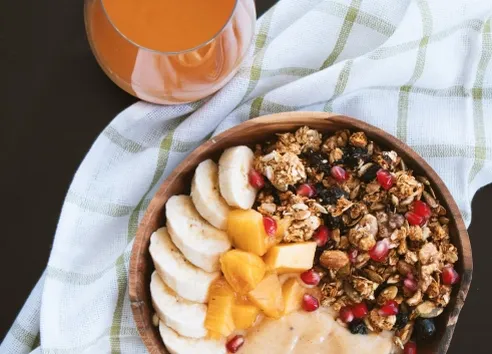Fibre and breast cancer.
What is the link?

Does a diet high in fibre reduce my risk of breast cancer?
An increasing number of studies show that a diet high in fibre is linked to a decreased breast cancer risk. Fibre may help prevent breast cancer in several ways.
Fibre can reduce the levels of oestrogen in the body by stopping oestrogen from being reabsorbed from your gut and helping remove oestrogen from the body. High levels of oestrogen increase breast cancer risk in both men and women.
Fibre can also help you maintain a healthy weight.
Tips for increasing the amount of fibre you eat.
Eat whole grains and beans.
Swap white rice, bread, and pasta for whole-grain kinds. Add beans, lentils, or chickpeas to your meals.
Eat veggies with every meal. Swap juice for whole fruit.
Include plenty of vegetables with meals – either as a side dish, or in a salad or add to sauces, stews or curries. Eat whole fruits instead of drinking fruit juices.
Drink at least 2 litres of water per day.
When you eat a lot of fibre, you should also drink plenty of fluids because fibre absorbs a lot of water.
Key facts about fibre and breast cancer risk.
- Dietary fibre has many effects on the body, especially on digestion and your gut microbiome.
- The British Nutrition Foundation recommends that you should eat at least 30g of fibre daily.
- Eating a variety of fibre-rich foods, like those that form the Mediterranean diet, helps create a diverse and stable gut microbiome, which is essential for good gut health.
How could fibre protect against breast cancer?
Many studies find that a diet high in fibre is linked with a lower breast cancer risk.
Eating a lot of fibre may also play a role in survival after a breast cancer diagnosis. A 2021 review of several studies concluded that eating a higher amount of fibre reduces the risk of dying after a breast cancer diagnosis.
Many actions in the body may explain how fibre might reduce the risk of breast cancer. Some of these include reducing the levels of oestrogen in the body. Long-term exposure to oestrogen is a well-established risk factor for breast cancer in men and women.
Fibre can stop oestrogens from being reabsorbed from the gut and gather oestrogens in the colon, which increases their excretion. Fibre also helps make short-chain fatty acids, which can have a protective effect against tumour development.
High-fibre diets can help prevent weight gain and obesity. Being overweight is an established risk factor for postmenopausal breast cancer.

Ask the scientist: How does fibre play a vital role in breast cancer risk?
Why is fibre important for your general health?
Eating fibre affects your body in many ways, most notably digestion. But it is also associated with preventive health effects. For example, it affects how fast you digest your food, the size and consistency of your stool, the frequency of your bowel emptying, how hungry or full you feel, and how your body absorbs nutrients.
Some dietary fibres are also prebiotics, which are special plant fibres that help healthy bacteria grow in your gut. When prebiotics are fermented, they produce short-chain fatty acids. They act as an energy source for the cells in the intestine. At the same time, they strengthen your intestines and positively affect blood sugar, fat metabolism and appetite regulation. Eating enough fibre helps good microorganisms in your gut to grow.
Eating more fibre also helps protect against conditions like heart disease, stroke, diabetes, obesity, high cholesterol, high blood pressure, and colon cancer. Getting fibre from different food sources, such as cereals, fruit and vegetables, is important for maximum health benefits.
What is fibre?
Fibre is a type of carbohydrate that your body cannot digest. Most carbohydrates are broken down into sugar molecules called glucose. Fibre cannot be broken down; instead, it passes through your body undigested. Dietary fibre is found almost exclusively in plants.
There are two types of fibre, soluble and insoluble. Each has important health benefits and plays different roles in the body. Soluble fibre dissolves in water and forms a gel-like substance in your stomach, slowing digestion. It may help control your blood sugar and cholesterol levels. It is found in apples, oats, peas, beans, brussels sprouts, and avocados.
Insoluble fibre does not dissolve in water. It adds bulk to your stool and helps food move through the stomach and intestines. Insoluble fibre is found in whole wheat flour, bran, nuts, seeds, leafy greens, and the edible skins of many fruits and vegetables.
Foods that are high in fibre.
Start your prevention journey today.
Take a moment right now to make one small, healthy choice today to increase how much fibre you eat. Here are 3 tips to help you get started:
- Start your day with fibre. Choose a high-fibre breakfast cereal, oatmeal, or whole-grain toast.
- Add fibre to your meals. Mix vegetables, beans, or lentils into your soups, stews, and salads.
- Snack on fibre. Grab a handful of unsalted nuts, seeds, or a piece of fruit.
Each small action builds momentum. Start today to build a healthier, stronger you for tomorrow.
Further reading
For more information, read our Fibre and Breast Cancer science review.
Last review: May-25 | Next review: May-28.
-
- British Nutrition Foundation. 2022. Fibre. https://www.nutrition.org.uk/healthy-sustainable-diets/starchy-foods-sugar-and-fibre/fibre/?level=Consumer (accessed 05.08.22)
- Reynolds, A. et al. 2019. Carbohydrate quality and human health: a series of systematic reviews and meta-analyses. The Lancet 393:434–45. https://www.researchgate.net/publication/330303329_Carbohydrate_quality_and_human_health_a_series_of_systematic_reviews_and_meta-analyses
- Farvid, M. S. et al. 2020. Fiber consumption and breast cancer incidence: A systematic review and meta-analysis of prospective studies. Cancer 126:3061–75. https://pubmed.ncbi.nlm.nih.gov/32249416/
- Cade, J. E. et al. 2007. Dietary fibre and risk of breast cancer in the UK Women's Cohort Study. International journal of epidemiology 36:431–38. https://pubmed.ncbi.nlm.nih.gov/17251246/
- Deschasaux, M. et al. 2013. Prospective association between dietary fiber intake and breast cancer risk. PloS one 8:e79718. https://www.ncbi.nlm.nih.gov/pmc/articles/PMC3828192/
- Farvid, M. S. et al. 2016. Dietary Fiber Intake in Young Adults and Breast Cancer Risk. Pediatrics 137:e20151226. https://www.ncbi.nlm.nih.gov/pmc/articles/PMC4771124/
- Farvid, M. S. et al. 2016. Lifetime grain consumption and breast cancer risk. Breast cancer research and treatment 159:335–45. https://www.ncbi.nlm.nih.gov/pmc/articles/PMC5014619/
- Key, T. J. et al. 2019. Foods, macronutrients and breast cancer risk in postmenopausal women: a large UK cohort. International journal of epidemiology 48:489–500. https://www.ncbi.nlm.nih.gov/pmc/articles/PMC6469308/
- Li, Q. et al. 2013. Dietary fiber intake and risk of breast cancer by menopausal and estrogen receptor status. European journal of nutrition 52:217–23. https://pubmed.ncbi.nlm.nih.gov/22350922/
- Narita, S. et al. 2017. Dietary fiber intake and risk of breast cancer defined by estrogen and progesterone receptor status: the Japan Public Health Center-based Prospective Study. Cancer causes & control : CCC 28:569–78. https://link.springer.com/article/10.1007/s10552-017-0881-3
- Park, Y. et al. 2009. Dietary fiber intake and risk of breast cancer in postmenopausal women: the National Institutes of Health-AARP Diet and Health Study. American Journal of Clinical Nutrition 90:664–71. https://www.ncbi.nlm.nih.gov/pmc/articles/PMC2728649/
- Partula, V. et al. 2020. Associations between consumption of dietary fibers and the risk of cardiovascular diseases, cancers, type 2 diabetes, and mortality in the prospective NutriNet-Santé cohort. American Journal of Clinical Nutrition 112:195–207. https://pubmed.ncbi.nlm.nih.gov/32369545/
- Sangaramoorthy, M. et al. 2018. Intake of bean fiber, beans, and grains and reduced risk of hormone receptor-negative breast cancer: the San Francisco Bay Area Breast Cancer Study. Cancer medicine 7:2131–44. https://www.ncbi.nlm.nih.gov/pmc/articles/PMC5943543/
- Zhang, C.-X. et al. 2011. Effect of dietary fiber intake on breast cancer risk according to estrogen and progesterone receptor status. European journal of clinical nutrition 65:929–36. https://pubmed.ncbi.nlm.nih.gov/21540873/
- Chen, S. et al. 2016. Dietary fibre intake and risk of breast cancer: A systematic review and meta-analysis of epidemiological studies. Oncotarget 7:80980–89. https://www.ncbi.nlm.nih.gov/pmc/articles/PMC5348370/
- Dong, J.-Y. et al. 2011. Dietary fiber intake and risk of breast cancer: a meta-analysis of prospective cohort studies. American Journal of Clinical Nutrition 94:900–05. https://academic.oup.com/ajcn/article/94/3/900/4411871
- Aune, D. & Chan, D. S. M. et al. 2012. Dietary fiber and breast cancer risk: a systematic review and meta-analysis of prospective studies. Annals of oncology : official journal of the European Society for Medical Oncology 23:1394–402. https://pubmed.ncbi.nlm.nih.gov/22234738/
- McRae, M. P. 2018. The Benefits of Dietary Fiber Intake on Reducing the Risk of Cancer: An Umbrella Review of Meta-analyses. Journal of Chiropractic Medicine 17:90–96. https://www.ncbi.nlm.nih.gov/pmc/articles/PMC6112064/#bb0220
- Travis, R. C. et Key, T. J. 2003. Oestrogen exposure and breast cancer risk. Breast Cancer Research : BCR 5:239–47. https://www.ncbi.nlm.nih.gov/pmc/articles/PMC314432/
- Costa D. A. et al. 2021. Human Microbiota and Breast Cancer-Is There Any Relevant Link?-A Literature Review and New Horizons Toward Personalised Medicine. Frontiers in microbiology 12:584332. https://pubmed.ncbi.nlm.nih.gov/33716996/
- Liu, S. et al. 2003. Relation between changes in intakes of dietary fiber and grain products and changes in weight and development of obesity among middle-aged women. The American journal of clinical nutrition 78:920–27. https://pubmed.ncbi.nlm.nih.gov/14594777/
- MRC Clinical Trials Unit at UCL. 2022. What is an observational study? | MRC Clinical Trials Unit at UCL. https://www.mrcctu.ucl.ac.uk/patients-public/about-clinical-trials/what-is-an-observational-study/ (accessed 11.12.22)
- Jayedi, A. et al. 2021. Dietary Fiber and Survival in Women with Breast Cancer: A Dose-Response Meta-Analysis of Prospective Cohort Studies. Nutrition and cancer 73:1570–80. https://www.tandfonline.com/doi/full/10.1080/01635581.2020.1803928

